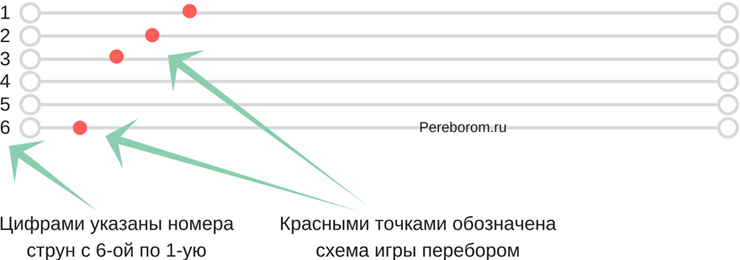
Types of guitar picks. 21 schemes of the game by bust.
Contents

Search types
Picking is one of the main ways to play the guitar. It involves plucking the strings and plucking the sounds separately, rather than simultaneously, as is the case with guitar strumming. This allows you to significantly expand the scope for arrangements and melodic moves, since it does not force you to remember exactly the construction and forms of chords. As with combat, there are a number of familiar and simple strumming patterns that are used in a large number of songs. It is about them that this article will be discussed – how they are played, called, and on what compositions they can be practiced.
Easy and simple busts
Based on the title and title of this article, it can be understood that all the ways of playing described here are suitable for beginners, as the basis for the development of fingers and technique. The thing is that the presented enumerations, although they sound very melodic, nevertheless do not give much space for improvisations and interesting melodic patterns or phrases. However, before playing beautiful busts fingerstyle – you need to definitely master the standard methods of execution.
The lightest of the presented list are definitely “Six” and “Four”, because they do not have a large number of strings in their composition. The first way is performed by the famous song of the Spleen group “God is tired of loving us”, and the second – Yesterday by the group “The Beatles”.
Notation on brute-force schemes
On the left side of the diagram, vertically arranged numbers indicate strings from 6th to 1st. The red dots indicate the scheme of the game by bust.

Search 4 “Four” schemes
In this way of playing, as the name implies, four strings are involved – bass, plus three upper ones – mi, si and salt. All schemes, one way or another, consist of these combinations.
B321
The first scheme is when you first pull the bass string, and then alternately the third, second and first. After that comes the bass again, and so on. It is very simple, and even a beginner will quickly get used to drawing.

B312
This scheme looks like this – first the bass is played, then the third, then the first, and then the second string. This enumeration is a little more difficult than the previous one, because the transition from third to first is less obvious, but it can also be mastered quite quickly.

B323
This enumeration is played like this – first you pull the bass, then the third string, then the second, and after that you return to the third. This way of playing is very simple, and it will not be difficult to learn it.

B123
Another way to play a XNUMX is to twang the bass first and then play all strings one through three in succession.

Reverse four
And this is a more complicated option. enumeration of the “Four”. It will take some time to practice coordination and maybe even play it slowly. It is played something like this: first pull the bass, first and second strings at the same time – they should sound together. After that, pull the third string – only she should play. On the third measure, twitch again the first and second, without the bass. And on the fourth – only the third.

The reverse four is more complicated than its counterparts, but it also sounds more interesting than the other busts – so it’s definitely worth learning how to play it.
B213
Oddly enough, but this is a more exotic type of enumeration – it is not used very often. His scheme looks like this – bass, then the second, then the first, and then the third. The result is an interesting melodic pattern, which, however, is not suitable for all songs.

B3213
A slightly modified version of the usual brute force, aimed at a richer sound. His scheme looks like this: bass, then third, then the second and first sounds simultaneously, then the third again. This makes the chord sound richer and more interesting.

Bust 6 “Six” schemes
“Six”, along with the battle of the same name, is the most classic type of all guitar strumming. He plays a huge number of both Russian and foreign songs, and guitarists most often begin their acquaintance with this playing technique from him.
B32123
The most classic type of “Six” is played in this way: you pluck the bass string, then successively play third, second, first, and, without stopping, second and third. It turns out a cyclical melodic motive, which can be recognized by a large number of songs played by him.

B321321
A non-standard way of playing, which you will meet much less often than the very first one. Iterating scheme looks like this: first, the bass plays along with the third, then the second and first strings sequentially. And after that, without stopping, the loss of the third, second and first is repeated. This scheme is slightly simpler than the others, since it requires less memory and coordination.

B12B12 (612512)
A very specific way of playing, which is not very common. The main difference is that in this case the bass sounds twice. In this case, the scheme looks like this: first comes the lower bass – that is, the sixth or fifth string, depending on the chord. After that, the first and second strings are played in sequence. Then, without stopping, you need to pull the upper bass – that is, the fifth or fourth string, depending on which one was played before. Then you play the first and second string in sequence. This type of six is more difficult than the others and will take a little more time to work out.

Songs to practice:
1. The Animals – House of the Rising Sun; 2. Spleen – I would like to pass; 3. Lube – There behind the mists; 4. Petliura – Soldier.
Search 8 “Eight” schemes
The most difficult category of fingerpicks, as they have long sequences of notes and strings involved. However, it is definitely worth learning how to play in this way, if only for the development of coordination and playing technique.
B3231323
This type of enumeration has the following scheme: first the bass is played, then the third, second, third, first, third, second and third strings are played in succession. That is, in fact, it has two identical melodic patterns, which are separated by the sound of the first string. In this way they play “Lone Star” chords.

B3212323
A slight modification of the classic “Eight” above. This type is played in this way: bass, then successively the third, second, first, second, third, second, third strings. We can say that this method is more obvious and convenient, since you are actually playing an ascending sequence of notes with an additional pass through the second and third strings.

B3231232
Another variation of enumeration. The scheme is based on the following pattern: bass, then third, second, third, first, second, third and second string.

B313B312 – for the song Bonfire
This type of enumeration perfectly illustrates the diversity of their types – this is a specific manner of playing, which was invented by Andrei Makarevich specifically for the song “Bonfire”, chords which can be found on the site. The scheme looks like this: first the bass is played, then the third, first, third in succession – and then the bass again, the third – the first and second strings. This is not a very simple drawing, which, however, will not be very difficult to master with proper training.

12312312
Unusual way of playing by bust. Its main difference lies in the absence of bass – and the presence of only high strings. It looks like it is written below:

First, second, third, first, second, third, first, second.
In general, nothing complicated – in fact, this is a repetition of the same melodic pattern several times.
Длинная Восьмерка 6-4-3-2-1-2-3-4
This type of picking got its name, because when playing it, in fact, you have to go through almost all the strings. The scheme looks like this: Bass – fourth – third – second – first – second – third – fourth. So they play chords “I believe”.

B1234123
An enumeration in which a descending note sequence is played. The scheme looks like this: bass, first, second, third, fourth, first, second, third strings.

6-4-3-4 and 5-4-3-4 – Ravens-DDT
Bust, which is played crows chords, compositions of the DDT group. The scheme looks like this: lower bass – fourth – third – and fourth string, after that, without stopping – upper bass – fourth – third – fourth string.

Songs to practice:
1. Time Machine – Bonfire (chords); 2. DDT – Crows; 3. Factor 2 – Lone Star; 4. Lyapis Trubetskoy – I believe; 5. Gaza Strip – Lyrica; 6. Bremen Musicians – The Sun Will Rise.
Waltzes
A specific type of busting, characteristic of the size 3/4. It is in it that they play, for example, chords “Walking on Water” – the famous song of the group Nautilus Pompilius. It is worth saying that in this case it is necessary to play with the report “One-two-three” – the rhythm of the waltz, from where the name of the manner of performance came from. That is, the bass will be at the expense of “one”, and the rest – at “two” and, accordingly, “three”.
Bust B(21)(21)
The scheme looks like this: Bass – and you need to pull the first and second string twice. Remember the rhythm of the waltz – and then everything will sound right.

Bust B(321)(321)
Modified version of the first method. The scheme is as follows: bass – you need to pull the top three strings twice at the same time.

More waltz B3(21)
The scheme looks like this: bass – then the third – and then at the same time you need to pull the second and first strings.

Songs to practice:
1. Nautilus Pompilius – Walking on the water; 2. Oleg Mityaev – The bend of the yellow guitar; 3. Bulat Okudzhava – Georgian song; 4. Crematorium – Garbage Wind; 5. Yuri Vizbor – My dear.
Conclusion
In general, there is nothing complicated in the above enumerations. The main task is to understand how they are played correctly, and then practice them on the songs below. Try to make each string sound as it should – that is, without bouncing, and also practice so that your fingers do not get confused in large note sequences. After working out these enumerations, you can begin to master the fingerstyle.





